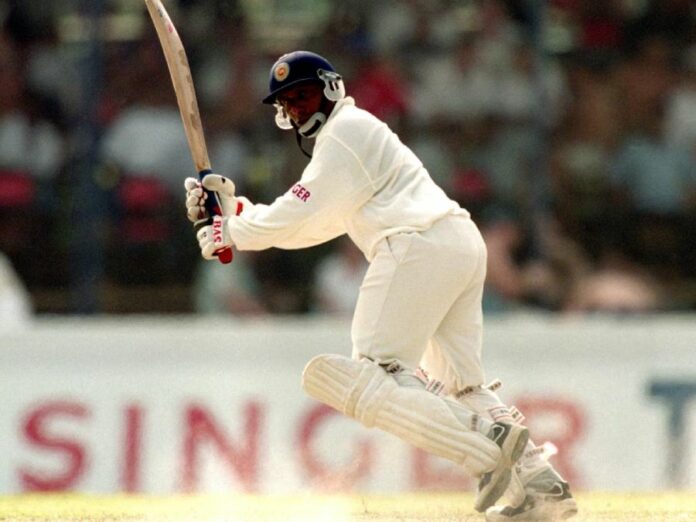A video clip that is 34 years old involving two of the greatest cricket players who graced the game has gone viral in social media.
The players involved in the clip are Aravinda de Silva and Wasim Akram, both at their prime age of 24. The incident takes place at the iconic Gabba, with all its natural beauty before reconstruction changed it into a concrete jungle. This is a Benson & Hedges tri-series game and in commentary is former Australian captains Richie Benaud and Ian Chappell.
Sri Lanka have had a decent start with the top three Hashan Tillekeratne, Athula Samarasekara and Asanka Gurusinha giving the team a solid platform. Heading into the final ten overs, Sri Lanka are in need of quick runs and fast bowler Rumesh Ratnayake is sent ahead of Aravinda as a pinch-hitter.
Soon, Aravinda joins Rumesh as another wicket falls. Aravinda wastes no time in the team’s search for quick runs. He upper cuts Wasim for a six over point. Chappell is lost for words. A scenario that doesn’t often happen with one of Australia’s toughest cricket captains. He finally asks, ‘Why do you need a pinch hitter when you have Aravinda who can play such shots.’
What is so special about the shot is that these are not short boundaries that you find in the modern day just over 60 meters. This is a gigantic boundary. This isn’t an ordinary bowler either. This is the great Wasim Akram.
Aravinda throws the kitchen sink in the next over too by stepping out and clearing long-on. This time Benaud asks the question, ‘Why do you need to play reverse sweeps when you can play proper cricketing shots like these.’ The admiration for Aravinda in Australia is unequivocal.
Kumar Sangakkara may have the big numbers but for feats such as these Aravinda will be fondly remembered by fans. He’s got to be the best batter produced by the country.
At the infancy of Sri Lanka’s cricket at the big stage, it is this man that carried the team on his shoulders scripting many famous wins.
His efforts in the 1996 World Cup semi-final and the final changed Sri Lanka’s cricketing fortunes forever, but there were other knocks such as the one in discussion here that were quite stunning. Sri Lanka became a formidable opponent in cricket thanks to Aravinda’s prowess.
The opportunities were limited for Aravinda in the early days. In his prime, from the age of 22 to 27 for five years he didn’t play a single international match at home. No team visited Sri Lanka from 1987 to 1992 due to the war.
Despite the limited opportunities, Aravinda could have gone on to become the first player to score 10,000 runs in ODI cricket. He was denied the milestone as the selectors launched an aggressive youth policy after Sri Lanka as defending champions were knocked out of the first round in the 1999 World Cup.
However, when things went south, lead up to the 2003 World Cup, Mr. Michael Tissera in his capacity as Chairman of Selectors recalled Aravinda to the side. By then he had missed three years of international cricket and others had caught up and reached the rare milestone of 10,000 runs. Yet, Aravinda made an impact in South Africa during that World Cup as Sri Lanka reached the semi-finals before losing to eventual champions Australia.
Some call Aravinda a trendsetter, a maestro and even a freak. A freak because he would grip the bat one way in the first innings of a Test match and change the grip in the second essay to counter challenges posed by the conditions or the attack.
Aravinda’s batting stance was copied by many aspiring cricketers but the problem was he would change the stance in the next series. The young blokes were perplexed not knowing what to do. Only a genius like him could do that. Lesser mortals could just only marvel.
Aravinda was the first Sri Lankan to play County Cricket. He signed a deal with Kent in 1995. He never played County Cricket again after that single season as Sri Lanka’s international commitment grew exceedingly following the World Cup win the following year. However, it opened up opportunities for many other Sri Lankans in England.
For Kent, he scored over 1600 runs in the First-Class season. His batting feats helped them to the one-day title, their first trophy in 17 years. With a bit more help from his team mates, Aravinda would have helped Kent for the one-day double that season as they lost the Benson & Hedges final to Lancashire at Lord’s where Aravinda made a hundred.
England legend Colin Cowdrey’s son Graham Cowdrey was part of that Kent side and he wrote this about Aravinda. “I can not believe any player, anywhere, has been so popular. When Aravinda packed his bags, he hugged each of us and I have never known a professional sports team so close to tears.”


















